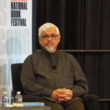Haroun and the Sea of Stories
(Libby/OverDrive eBook, Kindle)
Available Platforms
Description
Similar Titles From NoveList
Similar Authors From NoveList
Published Reviews
Publisher's Weekly Review
In a contemporary fable filled with riotous verbal pranks, Haroun, who unintentionally stopped time when he froze his father's esteemed storytelling ability, seeks to undo his error on a quest through a magical realm. ``As eloquent a defense of art as any Renaissance treatise . . . saturated with the hyperreal color of such classic fantasies as The Wizard of Oz and Alice in Wonderland ,'' said PW. (Nov.) (c) Copyright PWxyz, LLC. All rights reserved
Library Journal Review
Rashid Khalifa, a renowned storyteller, has lost his touch. Once an ``Ocean of Notions,'' he is now ``The Shah of Blahs.'' Haroun, Rashid's son, embarks on an epic quest to restore his father's creativity. One of the problems is environmental: the pollutants of modern civilization have clouded the once-clear streams of story. Another is conspiratorial: the Union of Tight Lips, minions of the evil Khattam-Shud, confound communication by switching on rows of ``darkbulbs.'' Rushdie's first book since the controversial Satanic Verses ( LJ 12/88) is more a postmodern fairy tale in the style of Angela Carter or John Barth than a traditional novel. The story is allegorical rather than realistic, the characters emblematic and two-dimensional. Poignant parallels between Rashid's predicament and Rushdie's own situation are what hold the reader's interest. An amusing but lightweight entertainment. Previewed in Prepub Alert, LJ 9/15/90.-- Edward B. St. John, Loyola Law Sch . , Los Angeles (c) Copyright 2010. Library Journals LLC, a wholly owned subsidiary of Media Source, Inc. No redistribution permitted.
Kirkus Book Review
Memorable bedtime story targeted for an audience as large as a bull's-eye on the side of a barn. The book is catalogued for January but will be shipped to bookstores in early November for Thanksgiving sales. Few readers will not find some tie between this story of a silenced father-storyteller and Rushdie's death sentence from the Ayatollah Khomeini--but it's a tie not stressed by the author. Perhaps the brightest aspect of the book is its bubbling good humor and witty dialogue, and then its often superb writing: ""There was once, in the country of Alifbay, a sad city, the saddest of cities, a city so ruinously sad that it had forgotten its name. It stood by a mournful sea full of glumfish, which were so miserable to eat that they made people belch with melancholy even though the skies were blue."" (Alifbay, the glossary here tells us, comes from the Hindustani word for ""alphabet."") The story: In the town of K, the Shah of Blah, Rashid Khalifa, a renowned storyteller and the father of Haroun, is deserted by his wife exactly at 11:00 a.m. and loses his power to tell stories. Haroun too loses the power to concentrate longer than 11 minutes. What's more, he insults his father's stories, calling them untrue, but then feels deep guilt for adding to his father's despair. In a P2C2E (a Process Too Complicated To Explain), it seems that most of Rashid's problems are part of the Great Story Sea becoming polluted and the Supplier of Story Water shutting down Rashid's supply. As a Water Genie explains to Haroun: ""The gentleman no longer requires the service; has discontinued narrative activities, thrown in the towel, packed it in. He has cancelled his subscription: Hence my presence, for purposes of Disconnection."" Which is the typical tumbling Rushdie jumpcat spoken by all and by Miss Blabbermouth, otherwise known as the Princess Batcheat Chattergy (batcheat= ""baat-cheet"" or chitchat), held prisoner in the Citadel of Chup, a castle built entirely of black ice. Parted from Rashid, Haroun on his own fights Khattum-Shud, who shuts down stories, and purifies the story waters in the Ocean of the Stream of Stories. A strong winner, though the storyline fades in and out of the prose--a fault that may pass unnoticed if the book's not read in one sitting. Copyright ©Kirkus Reviews, used with permission.
Library Journal Reviews
Rashid Khalifa, a renowned storyteller, has lost his touch. Once an ``Ocean of Notions,'' he is now ``The Shah of Blahs.'' Haroun, Rashid's son, embarks on an epic quest to restore his father's creativity. One of the problems is environmental: the pollutants of modern civilization have clouded the once-clear streams of story. Another is conspiratorial: the Union of Tight Lips, minions of the evil Khattam-Shud, confound communication by switching on rows of ``darkbulbs.'' Rushdie's first book since the controversial Satanic Verses ( LJ 12/88) is more a postmodern fairy tale in the style of Angela Carter or John Barth than a traditional novel. The story is allegorical rather than realistic, the characters emblematic and two-dimensional. Poignant parallels between Rashid's predicament and Rushdie's own situation are what hold the reader's interest. An amusing but lightweight entertainment. Previewed in Prepub Alert, LJ 9/15/90.-- Edward B. St. John, Loyola Law Sch . , Los Angeles Copyright 1990 Cahners Business Information.
Publishers Weekly Reviews
Following the unprecedented controversy generated by The Satanic Verses , Rushdie offers as eloquent a defense of art as any Renaissance treatise. Supposedly begun as a bedtime story for Rushdie's son, Haroun concerns a supremely talented storyteller named Rashid whose wife is lured away by the same saturnine neighbor who poisons Rashid's son Haroun's thoughts. ``What's the use of stories that aren't even true?'' Haroun demands, parroting the neighbor and thus unintentionally paralyzing Rashid's imagination. The clocks freeze: time literally stops when the ability to narrate its passing is lost. Repentant, Haroun quests through a fantastic realm in order to restore his father's gift for storytelling. Saturated with the hyperreal color of such classic fantasies as the Wizard of Oz and Alice in Wonderland , Rushdie's fabulous landscape operates by P2C2Es (Processes Too Complicated To Explain), features a court where all the attendant Pages are numbered, and unfurls a riotous display of verbal pranks (one defiant character chants ``You can chop suey, but / You can't chop me!''; elsewhere, from another character: `` `Gogogol,' he gurgled. `` `Kafkafka,' he coughed''). But although the pyrotechnics here are entertaining in and of themselves, the irresistible force of the novel rests in Rushdie's wholehearted embrace of the fable--its form as well as its significance. It's almost as if Rushdie has invented a new form, the meta-fable. Rather than retreating under the famous death threats, Rushdie reiterates the importance of literature, stressing not just the good of stories ``that aren't even true'' but persuading us that these stories convey the truth. As Haroun realizes, ``He knew what he knew: that the real world was full of magic, so magical worlds could easily be real.'' (Jan.) Copyright 1990 Cahners Business Information.
Publishers Weekly Reviews
In a contemporary fable filled with riotous verbal pranks, Haroun, who unintentionally stopped time when he froze his father's esteemed storytelling ability, seeks to undo his error on a quest through a magical realm. ``As eloquent a defense of art as any Renaissance treatise . . . saturated with the hyperreal color of such classic fantasies as The Wizard of Oz and Alice in Wonderland ,'' said PW. (Nov.) Copyright 1991 Cahners Business Information.
Reviews from GoodReads
Citations
Rushdie, S. (2000). Haroun and the Sea of Stories . Penguin Books Ltd.
Chicago / Turabian - Author Date Citation, 17th Edition (style guide)Rushdie, Salman. 2000. Haroun and the Sea of Stories. Penguin Books Ltd.
Chicago / Turabian - Humanities (Notes and Bibliography) Citation, 17th Edition (style guide)Rushdie, Salman. Haroun and the Sea of Stories Penguin Books Ltd, 2000.
Harvard Citation (style guide)Rushdie, S. (2000). Haroun and the sea of stories. Penguin Books Ltd.
MLA Citation, 9th Edition (style guide)Rushdie, Salman. Haroun and the Sea of Stories Penguin Books Ltd, 2000.
Copy Details
| Collection | Owned | Available | Number of Holds |
|---|---|---|---|
| Libby | 1 | 0 | 0 |






































